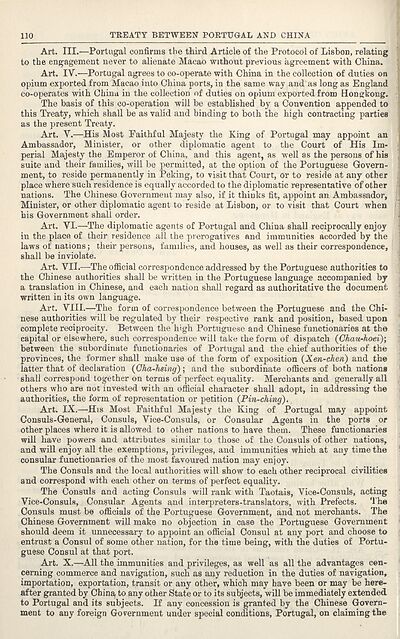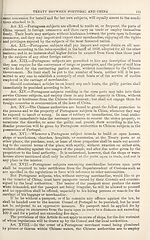1926
(162) Page 110
Download files
Complete book:
Individual page:
Thumbnail gallery: Grid view | List view

110
TREATY BETWEEN PORTUGAL AND CHINA
Art. III.—Portugal confirms the third Article of the Protocol of Lisbon, relating 1
to the engagement never to alienate Macao without previous agreement with China. '
Art. IV.—Portugal agrees to co-operate with China in the collection of duties on
opium exported from Macao into China ports, in the same way and as long as England
co-operates with China in the collection of duties on opium exported from Hongkong.
The basis of this co-operation will be established by a Convention appended to
this Treaty, which shall be as valid and binding to both the high contracting parties '
as the present Treaty.
Art. V.—His Most Faithful Majesty the King of Portugal may appoint an
Ambassador, Minister, or other diplomatic agent to the Court of His Im- ’j
perial Majesty the Emperor of China, and this agendas well as the persons of his
suite and their families, will be permitted, at the option of the Portuguese Govern¬
ment, to reside permanently in Peking, to visit that Court, or to reside at any other ,i
place where such residence is equally accorded to the diplomatic representative of other
nations. The Chinese Government may also, if it thinks fit, appoint an Ambassador, ;
Minister, or other diplomatic agent to reside at Lisbon, or to visit that Court when
his Government shall order. i
Art. VI.—The diplomatic agents of Portugal and China shall reciprocally enjoy
in the place of their residence all the prerogatives and immunities accorded by the ;
laws of nations; their persons, families, and houses, as well as their correspondence, :
shall be inviolate.
Art. VII.—The official correspondence addressed by the Portuguese authorities to
the Chinese authorities shall be written in the Portuguese language accompanied by
a translation in Chinese, and each nation shall regard as authoritative the document
written in its own language.
Art. VIII.—The form of correspondence between the Portuguese and the Chi¬
nese authorities will be regulated by their respective rank and position, based upon
complete reciprocity. Between the high Portuguese and Chinese functionaries at the ,
capital or elsewhere, such correspondence will take the form of dispatch (Chau-hoei);
between the subordinate functionaries of Portugal and the chief authorities of the
provinces, the former shall make use of the form of exposition (Xen-chen) and the
latter that of declaration (Cha-hsing); and the subordinate officers of both nations
shall correspond together on terms of perfect equality. Merchants and generally all
others who are not invested with an official character shall adopt, in addressing the
authorities, the form of representation or petition (Pin-ching).
Art. IX.—His Most Faithful Majesty the King of Portugal may appoint
Consuls-General, Consuls, Vice-Consuls, or Consular Agents in the ports or
other places where it is allowed to other nations to have them. These functionaries
will have powers and attributes similar to those of the Consuls of other nations,
and will enjoy all the exemptions, privileges, and immunities which at any time the
consular functionaries of the most favoured nation may enjoy.
The Consuls and the local authorities will show to each other reciprocal civilities
and correspond with each other on terms of perfect equality.
The Consuls and acting Consuls will rank with Taotais, Vice-Consuls, acting
Vice-Consuls, Consular Agents and interpreters-translators, with Prefects. The
Consuls must be officials of the Portuguese Government, and not merchants. The
Chinese Government will make no objection in case the Portuguese Government
should deem it unnecessary to appoint an official Consul at any port and choose to
entrust a Consul of some other nation, for the time being, with the duties of Portu¬
guese Consul at that port.
Art. X.—All the immunities and privileges, as well as all the advantages con¬
cerning commerce and navigation, such as any reduction in the duties of navigation,
importation, exportation, transit or any other, which may have been or may be here¬
after granted by China to any other State or to its subjects, will be immediately extended
to Portugal and its subjects. If any concession is granted by the Chinese Govern¬
ment to any foreign Government under special conditions, Portugal, on claiming the
TREATY BETWEEN PORTUGAL AND CHINA
Art. III.—Portugal confirms the third Article of the Protocol of Lisbon, relating 1
to the engagement never to alienate Macao without previous agreement with China. '
Art. IV.—Portugal agrees to co-operate with China in the collection of duties on
opium exported from Macao into China ports, in the same way and as long as England
co-operates with China in the collection of duties on opium exported from Hongkong.
The basis of this co-operation will be established by a Convention appended to
this Treaty, which shall be as valid and binding to both the high contracting parties '
as the present Treaty.
Art. V.—His Most Faithful Majesty the King of Portugal may appoint an
Ambassador, Minister, or other diplomatic agent to the Court of His Im- ’j
perial Majesty the Emperor of China, and this agendas well as the persons of his
suite and their families, will be permitted, at the option of the Portuguese Govern¬
ment, to reside permanently in Peking, to visit that Court, or to reside at any other ,i
place where such residence is equally accorded to the diplomatic representative of other
nations. The Chinese Government may also, if it thinks fit, appoint an Ambassador, ;
Minister, or other diplomatic agent to reside at Lisbon, or to visit that Court when
his Government shall order. i
Art. VI.—The diplomatic agents of Portugal and China shall reciprocally enjoy
in the place of their residence all the prerogatives and immunities accorded by the ;
laws of nations; their persons, families, and houses, as well as their correspondence, :
shall be inviolate.
Art. VII.—The official correspondence addressed by the Portuguese authorities to
the Chinese authorities shall be written in the Portuguese language accompanied by
a translation in Chinese, and each nation shall regard as authoritative the document
written in its own language.
Art. VIII.—The form of correspondence between the Portuguese and the Chi¬
nese authorities will be regulated by their respective rank and position, based upon
complete reciprocity. Between the high Portuguese and Chinese functionaries at the ,
capital or elsewhere, such correspondence will take the form of dispatch (Chau-hoei);
between the subordinate functionaries of Portugal and the chief authorities of the
provinces, the former shall make use of the form of exposition (Xen-chen) and the
latter that of declaration (Cha-hsing); and the subordinate officers of both nations
shall correspond together on terms of perfect equality. Merchants and generally all
others who are not invested with an official character shall adopt, in addressing the
authorities, the form of representation or petition (Pin-ching).
Art. IX.—His Most Faithful Majesty the King of Portugal may appoint
Consuls-General, Consuls, Vice-Consuls, or Consular Agents in the ports or
other places where it is allowed to other nations to have them. These functionaries
will have powers and attributes similar to those of the Consuls of other nations,
and will enjoy all the exemptions, privileges, and immunities which at any time the
consular functionaries of the most favoured nation may enjoy.
The Consuls and the local authorities will show to each other reciprocal civilities
and correspond with each other on terms of perfect equality.
The Consuls and acting Consuls will rank with Taotais, Vice-Consuls, acting
Vice-Consuls, Consular Agents and interpreters-translators, with Prefects. The
Consuls must be officials of the Portuguese Government, and not merchants. The
Chinese Government will make no objection in case the Portuguese Government
should deem it unnecessary to appoint an official Consul at any port and choose to
entrust a Consul of some other nation, for the time being, with the duties of Portu¬
guese Consul at that port.
Art. X.—All the immunities and privileges, as well as all the advantages con¬
cerning commerce and navigation, such as any reduction in the duties of navigation,
importation, exportation, transit or any other, which may have been or may be here¬
after granted by China to any other State or to its subjects, will be immediately extended
to Portugal and its subjects. If any concession is granted by the Chinese Govern¬
ment to any foreign Government under special conditions, Portugal, on claiming the
Set display mode to:
![]() Universal Viewer |
Universal Viewer | ![]() Mirador |
Large image | Transcription
Mirador |
Large image | Transcription
Images and transcriptions on this page, including medium image downloads, may be used under the Creative Commons Attribution 4.0 International Licence unless otherwise stated. ![]()
| Asian directories and chronicles > 1926 > (162) Page 110 |
|---|
| Permanent URL | https://digital.nls.uk/196490279 |
|---|
| Attribution and copyright: |
|
|---|---|
| Description | Volumes from the Asian 'Directory and Chronicle' series covering 1917-1941, but missing 1919 and 1923. Compiled annually from a multiplicity of local sources and research. They provide listings of each country's active corporations, foreign residents and government agencies of all nationalities for that year, together with their addresses. Content includes: various treaties; coverage of conflicts; currencies and taxes; consular fees; weights and measures; public holidays; festivals and traditions. A source of information for both Western states and communities of foreigners living in Asia. Published by Hongkong Daily Press. |
|---|---|
| Shelfmark | H3.86.1303 |
| Additional NLS resources: |
![[Page 109]Portugal: Treaty between Portugal and China](https://deriv.nls.uk/dcn4/1964/9026/196490268.4.jpg)
